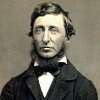“ The man enjoyeth not freedom from action, from the non-commencement of that which he hath to do; nor doth he obtain happiness from a total inactivity. ”
Henry David Thoreau, A Week on the Concord and Merrimack Rivers (1849). copy citation
| Author | Henry David Thoreau |
|---|---|
| Source | A Week on the Concord and Merrimack Rivers |
| Topic | freedom happiness |
| Date | 1849 |
| Language | English |
| Reference | |
| Note | |
| Weblink | http://www.gutenberg.org/files/4232/4232-h/4232-h.htm |
Context
““Children only, and not the learned, speak of the speculative and the practical doctrines as two. They are but one. For both obtain the selfsame end, and the place which is gained by the followers of the one is gained by the followers of the other.”
“The man enjoyeth not freedom from action, from the non-commencement of that which he hath to do; nor doth he obtain happiness from a total inactivity. No one ever resteth a moment inactive. Every man is involuntarily urged to act by those principles which are inherent in his nature. The man who restraineth his active faculties, and sitteth down with his mind attentive to the objects of his senses, is called one of an astrayed soul, and the practiser of deceit.”
source



